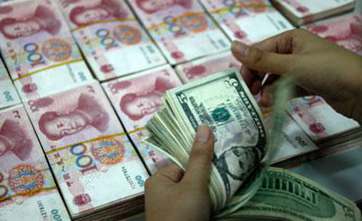

 |
BEIJING, April 20 (Xinhua) -- Pressure from capital flight has eased off markedly as firmer economic growth renewed foreign investment and the yuan steered clear of depreciation.
Net forex sales by Chinese banks rose slightly in March, official data showed Thursday.
Banks bought 145 billion U.S. dollars worth of foreign currencies and sold 156.6 billion dollars, resulting in net sales of 11.6 billion dollars last month, according to the State Administration of Foreign Exchange (SAFE). The deficit was up from February's 10.1 billion dollars but lower than the 19.2 billion dollars in January.
"Generally speaking, the pressure of cross-border capital outflow eased significantly in the first quarter. Supply and demand of foreign currencies have become more balanced," said SAFE spokesperson Wang Chunying at a press conference.
In Q1 banks' net forex sales stood at 40.9 billion U.S. dollars, down 67 percent from a year ago.
There has been concern about capital flight since the second half of 2016, when the economy was facing downward pressure and the yuan was on a losing streak against the U.S. dollar. The yuan has since gradually recovered.
The central parity rate of the yuan weakened 128 basis points to 6.8792 against the U.S. dollar Thursday, according to the China Foreign Exchange Trade System. Forex reserves also rose in March for the second month to 3.0091 trillion U.S. dollars, the first back-to-back increase since April 2016. In January, reserves slipped below the 3-trillion-dollar mark.
Lian Ping, chief economist at the Bank of Communications, predicts China's cross-border capital flows will maintain stability as the impact of U.S. rate cuts has lightened. It may even be possible to see net inflows or appreciation of the yuan.
The International Monetary Fund said in a report that the capital outflow pressure could be exacerbated by tightening of global financial conditions or a shift toward protectionism in advanced economies.
Wang admitted uncertainties from U.S. rate hikes and economic conditions but said the market is accustomed to the U.S. Federal Reserve's policy changes.
"China's forex reserves only edged down 1.4 billion U.S. dollars in the first quarter when the U.S. raised its interest rates for the third time since exiting quantitative easing," Wang said, in contrast with 183.8 billion dollars and 155.9 billion dollars in the first and second times.
Solid fundamentals and appeal to overseas investors will help capital flows move toward equilibrium, Wang said.
China ranked third in attracting foreign direct investment in 2016, after the United Statesand Britain, data from the United NationsConference on Trade and Development showed.
CAPITAL CONTROL RULED OUT
The SAFE spokesperson dismissed concerns about capital controls, saying "the open window will never be closed."
"China's forex management will not turn back," Wang said, adding that despite outflows, there were no new restrictions, only strengthened scrutiny on authentication.
Current account convertibility began about two decades ago, and gradual but steady liberalization of the yuan capital account has continued since then.
In February, the forex derivatives market was opened to some overseas non-central bank institutional investors to trade forwards, forex swaps and options.
 Fire brigade in Shanghai holds group wedding
Fire brigade in Shanghai holds group wedding Tourists enjoy ice sculptures in Datan Town, north China
Tourists enjoy ice sculptures in Datan Town, north China Sunset scenery of Dayan Pagoda in Xi'an
Sunset scenery of Dayan Pagoda in Xi'an Tourists have fun at scenic spot in Nanlong Town, NW China
Tourists have fun at scenic spot in Nanlong Town, NW China Harbin attracts tourists by making best use of ice in winter
Harbin attracts tourists by making best use of ice in winter In pics: FIS Alpine Ski Women's World Cup Slalom
In pics: FIS Alpine Ski Women's World Cup Slalom Black-necked cranes rest at reservoir in Lhunzhub County, Lhasa
Black-necked cranes rest at reservoir in Lhunzhub County, Lhasa China's FAST telescope will be available to foreign scientists in April
China's FAST telescope will be available to foreign scientists in April "She power" plays indispensable role in poverty alleviation
"She power" plays indispensable role in poverty alleviation Top 10 world news events of People's Daily in 2020
Top 10 world news events of People's Daily in 2020 Top 10 China news events of People's Daily in 2020
Top 10 China news events of People's Daily in 2020 Top 10 media buzzwords of 2020
Top 10 media buzzwords of 2020 Year-ender:10 major tourism stories of 2020
Year-ender:10 major tourism stories of 2020 No interference in Venezuelan issues
No interference in Venezuelan issues
 Biz prepares for trade spat
Biz prepares for trade spat
 Broadcasting Continent
Broadcasting Continent Australia wins Chinese CEOs as US loses
Australia wins Chinese CEOs as US loses